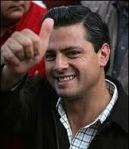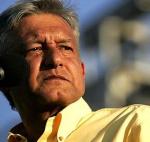Katie Putnam, The Mexico Institute’s Elections Guide, 6/11/2012
 The second and final debate between the presidential candidates was broadcast, due to popular pressure, on Mexico’s national television stations on June 10. In the event held exactly three weeks before the July 1 election, frontrunner Enrique Peña Nieto (PRI) once again held his own, thereby defending his lead. Observers disagreed on the winners and losers of the debate but most noted that the debate was unlikely to be a game changer in this electoral contest. The battle for second place, however, may be affected.
The second and final debate between the presidential candidates was broadcast, due to popular pressure, on Mexico’s national television stations on June 10. In the event held exactly three weeks before the July 1 election, frontrunner Enrique Peña Nieto (PRI) once again held his own, thereby defending his lead. Observers disagreed on the winners and losers of the debate but most noted that the debate was unlikely to be a game changer in this electoral contest. The battle for second place, however, may be affected.
The PRI
As we noted after the last debate, these settings posed the greatest risk to Peña Nieto, whose carefully controlled campaign has largely avoided off-the-cuff conversations after a few early mishaps. Once again, Peña Nieto did well, exceeding expectations. His responses were articulate and concrete, with specific policy objectives and strategies. The recent corruption allegations against fellow party members were hardly brought up, and Peña Nieto dismissed accusations that he too was corrupt; none of his rivals directly challenged him. A June 7th article in The Guardian based on internal Televisa documents that purport to demonstrate a scheme to ensure positive media coverage while Pena Nieto was governor of the State of Mexico was not even mentioned in the debate. Since the debate was broadcast on Televisa (as well as TV Azteca), maybe it was unsurprising that Peña Nieto avoided that major controversy.
As such, the candidate performed well and will likely emerge unscathed from the debate and with his frontrunner status intact.
The PAN
The PAN’s Josefina Vázquez Mota, who in the past month has ceded second place to the PRD’s Andrés Manuel López Obrador, came out fighting in the final debate. She characterized the PRI and PRD candidates as two faces of the same party, since the leftist party originally formed from a splinter group within the PRI. Peña Nieto, she said, represents a return to authoritarianism and López Obrador embodies intolerance and confrontation. Vázquez Mota stressed her respect for academic credential of Gabriel Quadri (PANAL) but she noted that a vote for him would increase the power of party founder and teachers’ union leader Elba Esther Gordillo.
Vázquez Mota was strong on policy proposals, defending her party’s record on the economy and on development, and touting her previous experience as Secretary of Social Development (2000-2005) and as Secretary of Education (2006-2009). She also attempted to engage the youth movement, “YoSoy132” (more background on this here). Some analysts, however, thought her aggressiveness went too far and thus lost some potency: The New York Times’ Randy Archibold joked on Twitter that Vázquez Mota might go after the sign language interpreter once she finished with her rivals.
It is possible that she will gain some additional support after the debate and challenge López Obrador for second place, though not enough to catch the frontrunner.
The PRD
López Obrador entered the debate on an upswing in the polls after a few weeks of student protests and corruption revelations that have hurt his rivals, and he seemed committed to preserving his position. His responses were measured, albeit less organized than Peña Nieto or Vázquez Mota, and he did not attack the frontrunner. Some observers on social media networks suggested he was trying to maintain a moderate image, while others lamented that he missed his opportunity to fully differentiate himself. His proposals on social policy, which might have been his strong suit, were generally repeated by the other candidates: the importance of eliminating nutritional poverty, of better educational opportunities, and more public health benefits were touted by all to varying degrees.
López Obrador emphasized again that he represents the only opportunity for true change. His performance in the debate most likely did not scare off supporters, as Vázquez Mota clearly hoped in calling him a populist and prone to causing economic crises, but also seemed unlikely to gain him many new followers.
PANAL
Quadri seemed keen to be the moderator for the evening, ending many interventions with a proposal he asked the other candidates to weigh in on. The others occasionally answered him, but he isolated himself from the debate when he incessantly demanded that they respond to unlikely themes such as an Octavio Paz Institute to promote Mexican culture and a free trade agreement with China.
Quadri’s response to Vázquez Mota’s claim that a vote in his favor would benefit “La Maestra,” Elba Esther Gordillo, was to point out a YouTube video in which his rival calls Gordillo a “dear friend.” While this may hurt Vázquez Mota, it seems unlikely to increase Quadri’s support.
Missing topics
Curiously, a number of recent events that have shaken up the political landscape in Mexico, including the youth protests, corruption scandals, and the media bias allegations were largely absent from the June 10th debate. Another issue that has been strangely absent is public security, crime and violence. It was not included as one of the three themes (“politics and government,” “Mexico in the world,” and “social and sustainable development”), which struck many viewers as odd considering it consistently ranks as the first or second major concern for Mexicans in opinion polls, along with the economy.





